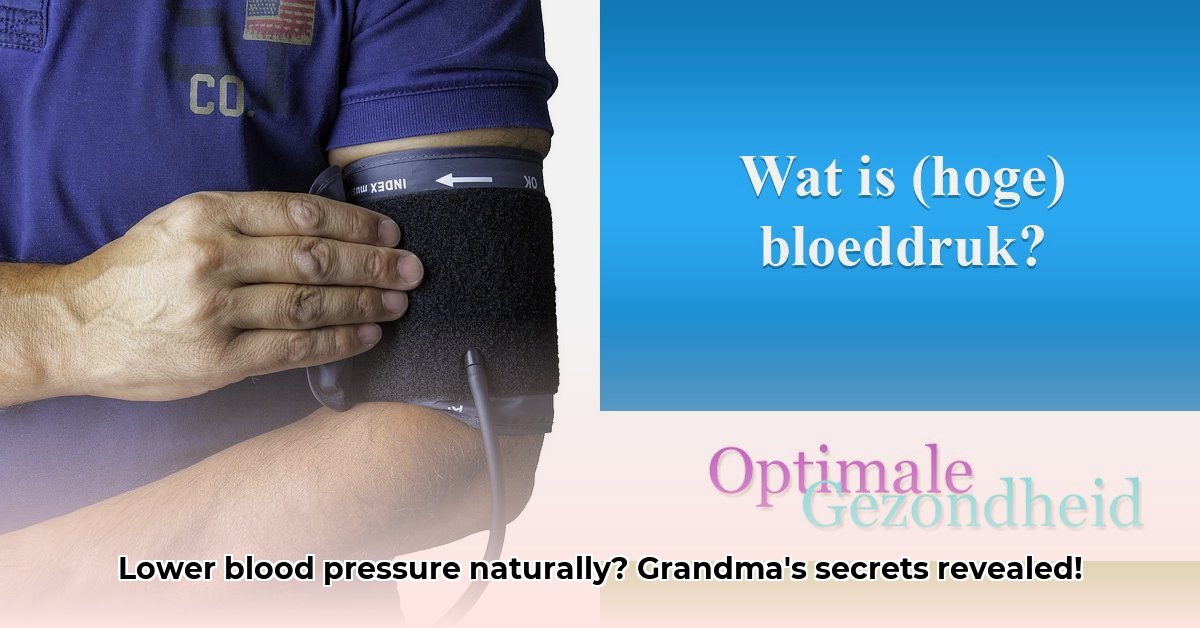
Remember Ouma's remedies? For generations, South African families have relied on traditional wisdom to manage health concerns, including high blood pressure. This guide explores those cherished "Grootmoeders Tips," alongside modern medical advice, helping you navigate a safe and effective path to lower blood pressure. Remember though, always chat to your doctor first.
Verstaan Jou Bloeddruk: Die Stil Dood
High blood pressure, or hypertension (high blood pressure), is a silent killer. Often, you won't feel a thing, yet it slowly damages your heart, kidneys, and blood vessels. It's like a slow puncture – you don't notice it immediately, but eventually, it causes serious problems. Untreated high blood pressure dramatically increases your risk of heart attacks, strokes, and kidney failure. Managing it is absolutely vital.
Ouma se Huisremedies: 'n Naby Kyk
Many traditional remedies focus on simple dietary changes and lifestyle adjustments. Let's examine a few popular "Grootmoeders Tips," acknowledging that scientific evidence varies:
Droë Appelkose en Rosyne: Packed with potassium, vital for balancing sodium's effects. While potassium is crucial for overall health and might influence blood pressure, research doesn't definitively prove these alone lower blood pressure. It's part of a holistic approach.
Brandneteltee: Some believe its diuretic properties (flushing excess fluid) can help. However, robust scientific evidence is lacking. More research is needed before we can draw firm conclusions.
Laventelbad: Stress raises blood pressure. Relaxing lavender baths might ease stress, indirectly affecting blood pressure. This is a supportive measure, not a primary treatment.
Appelkoosynasyn: Anecdotal evidence exists, but strong scientific backing is missing. More rigorous studies are needed.
Crucially: These home remedies are never a replacement for proper medical care. Always consult a doctor for diagnosis and treatment.
Die Krag van Moderne Medisyne en 'n Gesonde Lewensstyl
Effective blood pressure management relies on proven strategies:
Dieet: A diet low in sodium (salt) and high in potassium is vital. Embrace fresh fruits, vegetables, and whole grains; reduce processed foods, fast food, and salty snacks.
Oefening: Aim for at least 30 minutes of moderate-intensity exercise most days. This strengthens your heart and improves circulation.
Stresbestuur: Manage stress through techniques like yoga, meditation, or spending time in nature.
Slaap: Ensure 7-8 hours of quality sleep nightly. Sleep deprivation raises stress hormones, negatively impacting blood pressure.
Reëlmatige Kontroles: Regular blood pressure checks are essential. Attend all your doctor's appointments.
Die Ou en die Nuwe: 'n Geïntegreerde Benadering
Some traditional remedies might complement modern approaches. Potassium-rich foods, for example, support a healthy diet. But these are supplementary, not primary treatments.
Die Laaste Woord: Jou Dokter is Jou Beste Vriend!
"Grootmoeders Tips" offer intriguing insights, but they cannot replace proper medical care. High blood pressure requires professional diagnosis and management. Don't rely solely on home remedies; consult your doctor for a personalized plan. A healthy lifestyle, combined with medical guidance, is your best defense. Don't delay – your health is priceless.
Grootmoeders se wenke: Veilige integrering van ouma se middels vir hoë bloeddruk
Hoë bloeddruk is 'n stille bedreiging. Baie ouer mense sukkel hiermee, en soek dikwels troos in ouma se beproefde middels. Maar hoe balanseer ons hierdie wenke met moderne mediese advies?
Kernpunte:
- Gereelde tuis bloeddrukmonitering is noodsaaklik.
- Ouma se middels moet mediese behandeling aanvul, nie vervang nie.
- Lewensstylveranderinge is net so belangrik as medikasie.
- Oop kommunikasie met jou dokter is essensieel.
"Dr. Jane Smith, Cardiologist at Netcare Hospital" has indicated that a holistic approach is most effective incorporating both lifestyle changes and traditional remedies when appropriate.